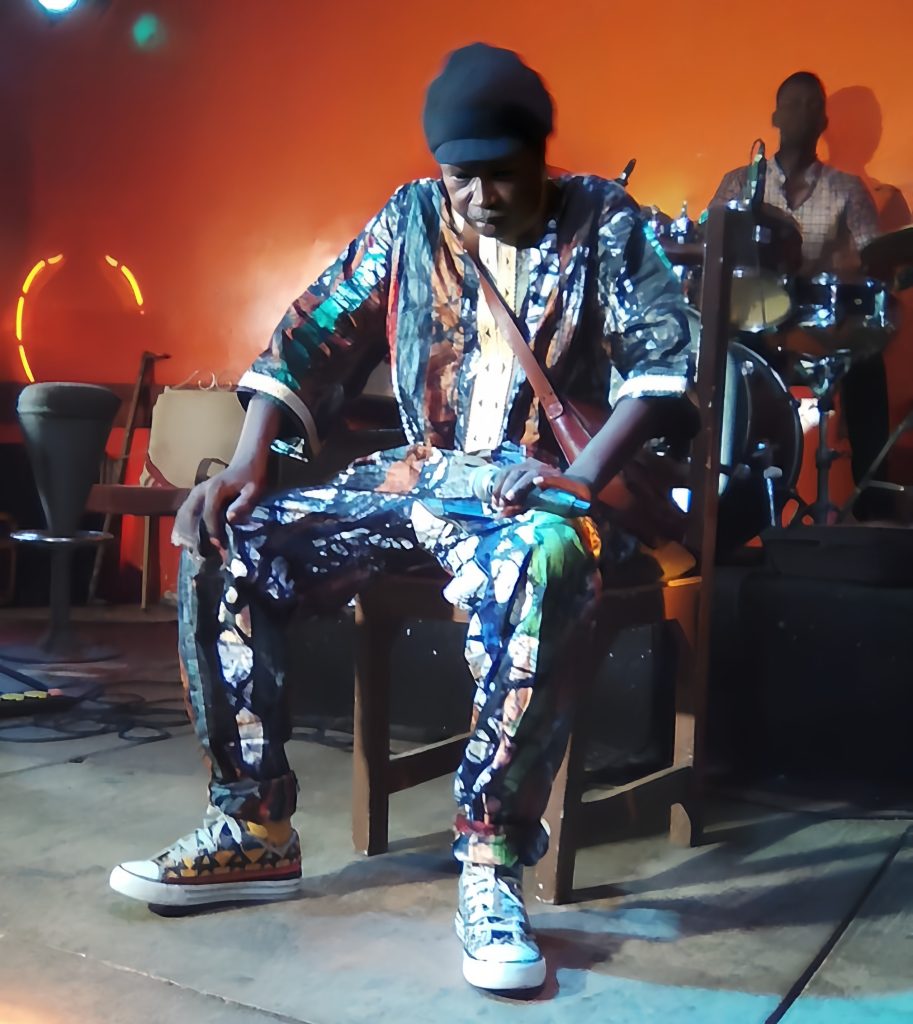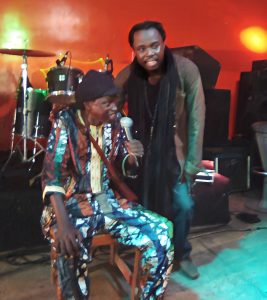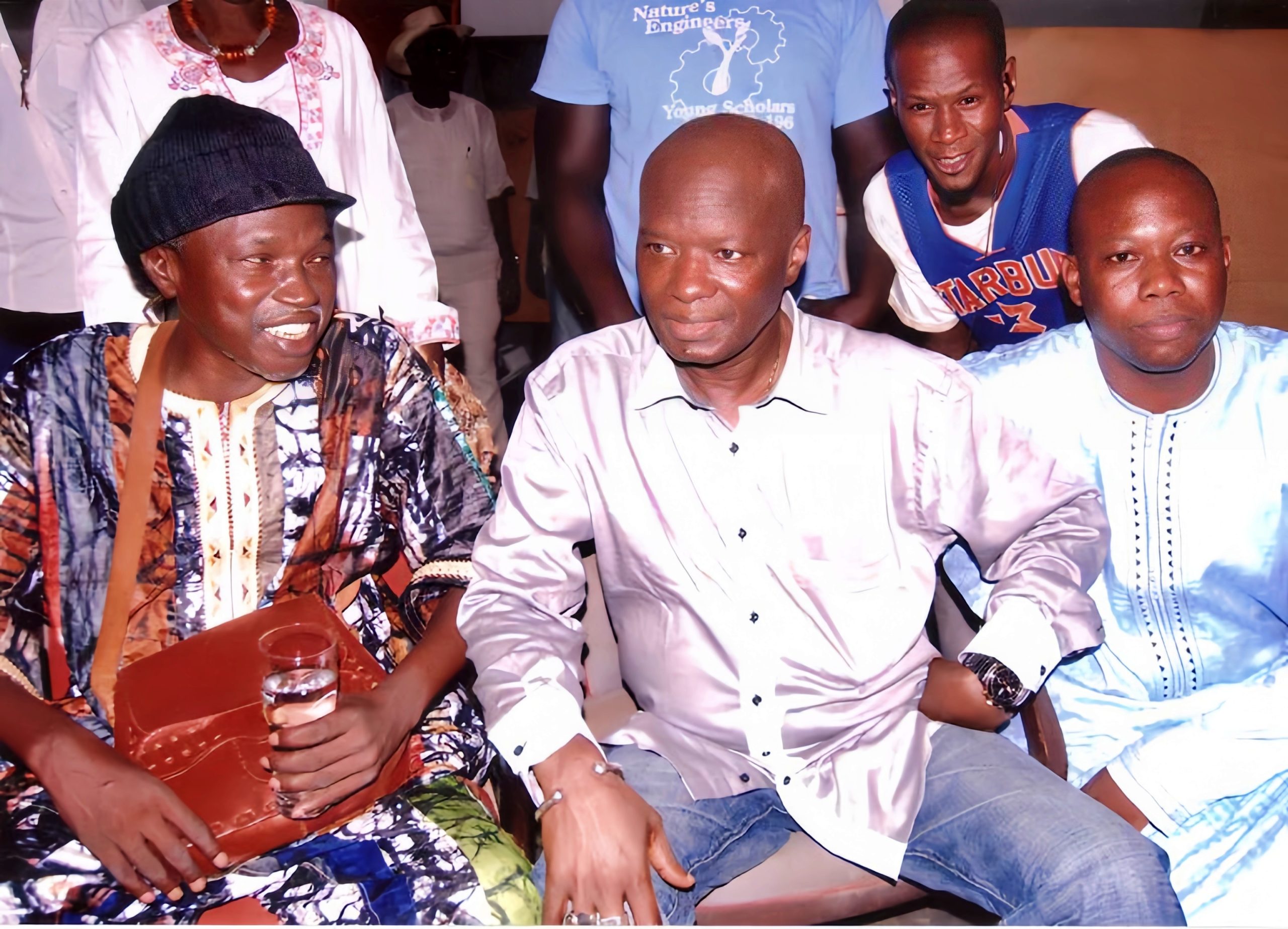Gambiaj.com – (BANJUL, The Gambia) – On October 11, 2015, The Gambia lost one of its brightest cultural icons, Musa Afia Ngum. He died in Dakar only hours after what would become his farewell performance, staged at Just4U by Senegalese superstar Youssou Ndour’s Television Futurs Médias.
Musa Ngum sang at Just 4U, a Dakar pub, in front of a crowd of admirers on the eve of his final appeal to God. Among the audience were VIPs such as former Senegal Prime Minister Souleymane Ndéné Ndiaye and officials from the government of Macky Sall at the time.
Frail and visibly ill, Musa had nonetheless drawn a crowd eager to hear the legendary shrill falsetto that defined his career. Many went to celebrate his music; others came to witness what felt like a final goodbye.
Before taking the stage, Moussa Ngum enjoyed dinner with his friend Omar Pène and the other members of the Super Diamono. He also played in duet with Senegalese icon Cheikh Lô as if bidding farewell to the Senegalese music scene.
Before departing Just 4U, he snapped pictures with his fans to round off the evening.
Rumors of his death had circulated only weeks earlier, prompting Musa himself to appear in public to declare he was still alive. But his weakened appearance left many Gambians and Senegalese asking quietly, “Yes, thank Allah—but for how long?”
Soon after, Musa—the “one-sock freak,” as some fondly called him, with his greyish dreadlocks, patchwork Murid garments, and perpetually dazed artist’s aura—was gone.
He passed out a few hours later, in the early hours of the morning, and was taken to Dakar’s Aristide Le Dantec Hospital, where he passed away.

For Gambians, however, this was not the first time they had “lost” him. By some counts, it was the third and final loss, one that struck differently at home than it did among his legion of fans across the border in Senegal.
Roots and Early Inspirations
Musa Afia Ngum was born in 1953 in Fatoto, eastern Gambia, where his father worked for a groundnut trader.
His family, the Ngomens of Banjul, traced their roots to the geweul (griot) tradition and had settled in the capital as refugees after the 19th-century upheavals surrounding Muslim warrior-king Maaba Jaahu Bah.
He began his schooling in Fatoto before moving to Banjul, where he attended Wesley School and later the BCC Town Council School.
But Musa carried with him from his childhood a deep musical imprint—nurtured by the sounds of the mulo (or kontingo), a one-stringed instrument.
As his parents frequently traveled to Bathurst (now Banjul), young Musa was often left in the care of a night watchman, who would lull him to sleep with its melodies. These early nights planted in him a lifelong passion for music.
In Banjul, Musa encountered another soundscape: the junjung beat of Wolof tradition. As a child of a griot family, he was constantly exposed to marriage ceremonies and cultural gatherings where he performed.
This gave him the chance to experiment—syncopating rhythms and blending Manding string traditions with Wolof percussion.
He would soon become part of a cultural experiment that mirrored the identity crisis of newly independent African states: whether to embrace precolonial roots or forge modern, global directions.

Rise in Music
Musa’s career found momentum through the legendary Super Eagles of the 1960s and their offshoots, including collaborations with Ousman Sosseh, Ousou Lion Njie, Adama Sallah, and Musa Njie.
Alongside these ventures, Musa participated in sambasoho, the graduation ceremonies of Wolof manhood rites, performing kassak songs with his uncle Koto Ngum.
This duality—between ethnic tradition and modern Euro-Latin-influenced pop—was central to Musa’s art. In his music, one could hear the pulse of the global sounds of the 1960s—Cuban boleros, Congolese rumba, Ghanaian highlife, even echoes of The Beatles—layered with the raw beats of Gambian and Wolof traditions.
From open-air performances in Banjul’s bustling streets to experiments in cultural fusion, Musa embodied a restless creativity.
His works, like Yen Overier (O You Working Men), his tribute to his son Ismaila, and his epic on the Manding empire of Kaabu, remain enduring classics, blending kora, haalam, and reetie strings into unforgettable soundscapes.
Exile and Cultural Loss
The turbulent politics of The Gambia shaped Musa’s path. Following the 1981 Kukoi Samba Sanyang rebellion, in which several members of Ifangbondi (formerly Super Eagles) were arrested, Musa left for Senegal.
The Gambia was entering cultural decline, while Dakar was flourishing under a vibrant pop scene.
There, Musa became part of the Super Jamano band, working with greats like Maiga, Omar Pène, and Lamin Faye. Together they produced mbalax hits like Omaro, Bamba Sa Mamla, Borom Daarou, and Jarama.
Dakar became a battleground of musical rivalries—Youssou Ndour’s Super Étoile versus Thione Seck’s Ramdan Band and Musa’s own Jamano—each competing for fans, cassette sales, and the attention of Senegal’s emerging middle class.
This rivalry enriched Senegal’s music, setting the stage for its global dominance. By contrast, The Gambia’s musical scene languished, deprived of many of its finest talents. Musa, like others, was lost to Gambians not only physically but culturally.
Refusing Compromise
Musa’s second “loss” to The Gambia came in 1997, when President Yahya Jammeh invited him back. Musa visited but refused to stay, unwilling to serve as a palace griot to an authoritarian regime. His art, he believed, was not to be suffocated by sycophancy.
Through the 1980s and 1990s, Musa remained a pillar of Senegal’s musical renaissance, but Gambians were left with the painful realization that their country had missed the opportunity to nurture its own. While Senegal soared with Youssou, Thione, and Xalam, Gambian music slipped into a vacuum.
Legacy
Musa Afia Ngum’s life was not only about concerts and cassettes; it was a mirror of the cultural, political, and artistic struggles of his time. He represented the tension between tradition and modernity, between national identity and globalization, and between free art and political patronage.
In the end, Musa remained true to his music. He never surrendered it to power, nor allowed it to be diminished by compromise. For that, he is remembered not only as a musician, but as a cultural icon whose life traced the possibilities and failures of Gambian art.
Musa Afia Ngum rests in peace. His voice, however—soaring, haunting, unforgettable—remains.
Updated From The Gambia Journal Archives, Oct 11, 2015










